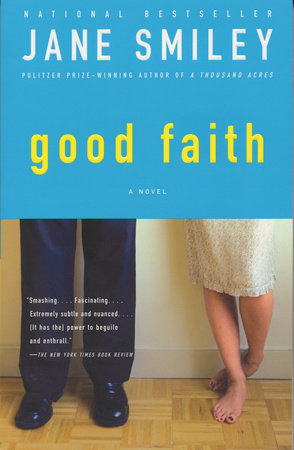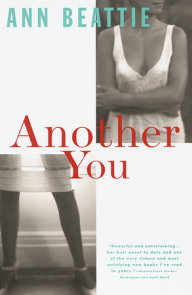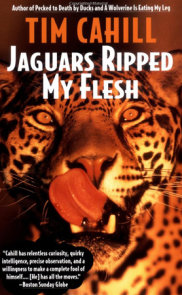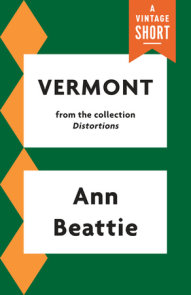READERS GUIDE
NATIONAL BESTSELLER“Smashing. . . . Fascinating. . . . Extremely subtle and nuanced. . . . [It has the] power to beguile and enthrall.” —The New York Times Book Review
The introduction, discussion questions, suggested reading list, and author biography that follow are designed to enhance your group’s reading of Jane Smiley’s Good Faith. In this new novel she brings her extraordinary gifts to the seductive, wishful, wistful world of real estate, in which the sport of choice is a mind game.
Introduction
Joe Stratford is a good and trustworthy guy who makes an honest living helping nice people buy and sell nice houses. He’s recently divorced, not yet forty-years-old, and pretty happy with his life. Felicity Ornquist, the married daughter of his business partner, friend and mentor, Gordon Baldwin, is suddenly taking a romantic interest in Joe, much to his surprise and delight.The year is 1982, and on the economic front a different era has dawned. Joe’s new friend, Marcus Burns from New York, seems to be suggesting that the old rules are ready to be repealed, and now is the time you can get rich quick. Really rich. And Marcus not only knows that everyone is going to get rich, he knows how. Because Marcus has just quit a job with the IRS. Marcus wants to buy Salt Key Farm, an enormous privately-owned estate, and turn it into an upscale development with 400 houses, a luxury golf course, the works. He wants Joe and Gordon to be his business partners, and they eagerly oblige.
Good Faith captures the seductions and illusions that can seize America during our periodic golden ages, when every Main Street holds the promise of El Dorado. To follow Joe as he does deals and is dealt them, in this newly liberated world of anything goes, is a roller-coaster ride through the fun part of the 1980s. It is Jane Smiley in top form—funny, smart, and always brilliantly entertaining.
Questions and Topics for Discussion
1. Having given Joe Stratford the role of narrator, Smiley gives her readers a great deal of access to Joe’s thoughts. What difference does it make that the novel is narrated in first person rather than third? Why does Smiley give us the story from Joe’s perspective?
2. What kind of a person is Joe? What does he think about himself, his marriage to Sherry [pp. 15–16], and his life? How accurate are his judgments about himself and other people?
3. Look closely at a couple of scenes in which Felicity and Joe are alone together. What specific details of Smiley’s writing style affect the reader’s experience of their love affair? Does Felicity love Joe? Does he love her? If he does, why does he not pursue her more actively?
4. Discuss the main elements of Felicity’s character. What is admirable about her? To what degree is she a typical dissatisfied homemaker motivated by boredom and restlessness? Is she playing a game with Joe for her own amusement? How important is the conversation between Felicity and Joe in which she tells him, “You do tempt me to find the limits of your kindness” [see pp. 141– 43]?
5. What do secondary yet vibrant characters like the Davids, Gottfried Nuelle, and George Sloan contribute to the novel’s world? Do they create a sense of realism? Are they there for comic relief? How important is humor in Smiley’s writing?
6. In what sense is Jane Smiley interested in exposing certain truths about small-town, middle-class America? What points does Good Faith raise about how ordinary people respond when they seem to see a chance to increase their wealth and raise their social status? What social concerns might have motivated Smiley to take on a novel about the 1980s? How is the present social climate different, and how is it similar, to those greedy years?
7. Is Joe a man who is looking for others to tell him what to do? Consider the descriptions of his relationship with Sally Baldwin and with his ex-wife Sherry. Consider his relationship with Marcus, and with Felicity. Is passivity a major flaw in Joe? Might it be considered a part of his charm?
8. What effect has Joe’s upbringing had on his character? Discuss his relationship with his parents and his rejection of their religious life. How strong a sense of ethics does Joe have? At what point, if any, does he begin to act and think more like Marcus?
9. How does Smiley present Marcus Burns, and how does she develop his character? What are his attractive qualities? Does Smiley imply that Marcus had talents that were somehow misdirected? What propels him into criminality?
10. What is Marcus’s appeal to Joe? On what is their friendship based? On page 413 Joe describes the after-effects of Marcus’s betrayal and wonders why, since Marcus had already received the money from the loan, he also took Joe’s savings. What might have been Marcus’s reason for delivering this deeply personal blow to Joe’s self-esteem?
11. Is this novel concerned more with character or with plot? To what degree is the element of surprise important to the story? Is there a sense of inevitability about what is going to happen to Joe, and to Joe’s money? If so, how does this affect the reading experience? What, if anything, is surprising about the final chapters?
12. The novel raises interesting questions about real estate development, the value of the countryside, and one’s sense of place. Can you infer Smiley’s feelings about the widespread transformation of the American landscape during such periods as the 80s? What human emotions drive the forces of change?
13. Is it surprising that central characters like Joe, Gordon, and Felicity escape prosecution? What conclusions can the reader draw from Felicity’s involvement with Marcus and Jane?
14. Is it surprising that central characters like Joe, Gordon, and Felicity escape prosecution? What conclusions can the reader draw from Felicity’s involvement with Marcus and Jane?





















